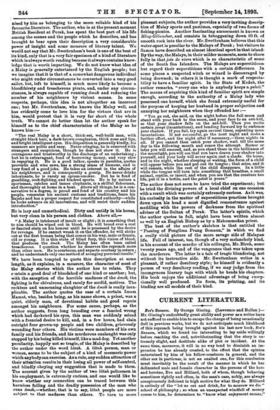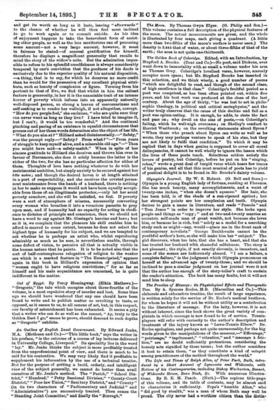CURRENT LITERATURE.
Eve's Ransom. By George Gissing. (Lawrence and B alien )- Mr. Gissing's undoubtedly great ability and power as a writer have not sufficed to enable him to escape the charge of being occasionally dull in previous works, but we do not anticipate much likelihood of this reproach being brought against his last new book, Eve's Ransom, which we found too interesting to lay aside willingly before reaching the end, notwithstanding that the story is ex- tremely slight, and destitute alike of plot or incident. At the same time, moreover, it will in no way tend to diminish an im- pression he has already created, to the effect that the opinion entertained by him of his fellow-creatures in general, and the other sex in particuar, is not an exalted one, for this conclusion must inevitably be the result of the manner in which he has delineated male and female character in the persons of the here and heroine, Eve and Hilliard, both of whom, though behaving sometimes rightly and often, in the man's case, nobly, are always conspicuously deficient in high motive for what they do. Hilliard is entirely of the " let us eat and drink, for to morrow we die " school of philosophy ; so when an unexpected windfall of money comes to him, he determines to "know what enjoyment means," and get its worth as long as it lasts, leaving " afterwards " to the chance of whether he will then feel most inclined to go to work again or to commit suicide. As his idea of enjoyment happens to take the benevolent form of assist- ing other people, as well as the less meritorious one of procuring some amount—not a very large amount, however, it must in fairness be stated—of sensual gratification for himself, therefore he displays a magnificent generosity that recalls to mind the story of the widow's mite. But the admiration impos- sible to refuse to his splendid unselfishness is always considerably tempered by one's conviction that the goodness of his deeds is exclusively due to the superior quality of his natural disposition, —a thing, that is to say, for which he deserves no more credit than he would for the possession of any excellent physical attri- bute, such as beauty of complexion or figure. Turning from his portrait to that of Eve, we find that whilst in him the salient feature is generosity, in her it is the unamiable trait of an intense horror of poverty which infuses into an apparently naturally well-disposed person, so strong a leaven of mercenariness and self-seeking as to render her wellnigh, if not altogether, corrupt. "How do you people feel," she exclaims, " who are quite sure they can never want as long as they live ? I have tried to imagine it, but I can't ; it would be too wonderful." And the continual pinching and paring of an existence in squalid circumstances that presses out of her these words determines also the object of her life. " What do you aim at ? " Hilliard asked disinterestedly.—" Safety," was the prompt reply.—" Safety ? From what ?"—" From years of struggle to keep myself alive, and a miserable old age."—" Then you might have said—a safety-match." When in spite of her sincere gratitude to Hilliard she deceives and throws him over in favour of Narramore, she does it solely because the latter is the richer of the two, for she has no particular affection for either of them. Thoughts of love have nothing whatever to do with her matrimonial ambition, but simply anxiety to be secured against her bale noire; and though the desired haven is at length attained in a port of respectability, and she receives the coveted perma- nent maintenance from the hands of a husband, there is nothing in her to make us suppose it would not have been equally accept- able from those of an illegitimate protector,—only let her avoid poverty somehow, and she will be satisfied, we feel. If poverty were a sort of atmosphere of miasma, necessarily converting every woman who breathes it into a voracious parasite to prey upon man, and if humanity had no capacity for acting in obedi- ence to dictates of principle and conscience, then we should not have a word to say against Mr. Gissings's heroine and hero; but as it is, we complain that the pleasure his skill enables him to afford is marred to some extent, because he does not select the highest type of humanity for his subject, and we are tempted to ask whether he is perhaps an artist who, whilst reproducing admirably as much as he sees, is nevertheless unable, through some defect of vision, to perceive all that is actually visible in the human nature that he paints. It is to be noted also that the sort of half-contemptuous relegation of religion to the weaker sex which is a marked feature in " The Emancipated," appears again in this book in Hilliard's expression of opinion that "woman ought to have religious convictions;" for so far as himself and his male acquaintance are concerned, he is quite indifferent in the matter.



































 Previous page
Previous page